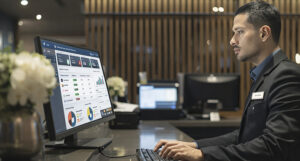
In the hospitality industry, the change in technology never ends. Recently, the hotel billing software has become an effective tool that has changed the whole approach to billing and greatly added to the guests’ satisfaction. This article will explore the top tips on rolling out hotel billing software on your property, including some of the benefits and issues to be considered when adopting the transformative technology.
The Evolution of Hotel Billing Software
The changes in hotel management systems, as is the case with hotel billing software, have been considerable. However, this has not been the case historically since traditional paper-based billing systems were common, and hence, bills would be delivered physically to guests. Nonetheless, digital technology has rendered manual ways of dealing with the problem obsolete. In the present, hotel billing software has turned out to be an inseparable element of the hospitality business, providing a smooth, flowing billing process for hotel guests.
Benefits of Hotel Billing Software
- Efficiency: Hotel billing software implementation simplifies the billing process, thereby minimizing the possibility of mistakes and delays. This helps your team create invoices quicker and more accurately, which improves organizational efficiency as a result.
- Cost Reduction: In the long term, using hotel billing software can save an organization a large amount of money by reducing the amount of paper used and eliminating manual processes. Not only does this benefit the environment, but it puts more money into the pockets of your house.
- Improved Guest Experience: A smooth and trouble-free billing process is appreciated by guests. The simplicity of the check-out process is achieved with the use of hotel billing software that makes it easy for guests to clear their accounts. It leads to satisfaction and positive feedback.
- Data Accuracy: Automated billing makes it unlikely for errors resulting from manual entry to occur. Good billing increases trust between your property and guests, instilling loyalty.
- Enhanced Reporting: The typical hotel software includes reporting features that are designed to provide you with a deeper understanding of how well your property is performing financially. Such insights are valuable in making strategic decisions for maximum profitability.
Implementation of Hotel Billing Software:
- Thorough Training: Make sure to train your staff on how to use hotel billing software before implementing it into full use. The staff comprises front desk staff, housekeeping personnel, and financial personnel. Thoroughly trained, you are prepared to leverage the software’s full capabilities with your team.
- Data Migration: If you are transitioning from a manual billing system to older software, data migration can be something to consider. The company has to enter the historical billing data using the new system. It is important that the records are accurate and that there is no data loss in the process of transition.
- Integration: You should be able to integrate your hotel billing software smoothly with the rest of your software, such as PMS and other applications—data consistency in real-time updates to other departments through integration.
- Customization: Many of the available hotel billing software solutions provide the option to edit invoices to tailor them to your property’s brand and style. A personalized invoice leaves an impression on your guest.
- Security Measures: When it comes to guest information and financial data, data security takes on great importance. Ensure you use effective security procedures, such as encryption and access controls, to safeguard sensitive data.
- Regular Updates and Maintenance: keep up-to-date with software updates and maintenance. This means that your hotel billing software will always function correctly, remain secure, and conform to any changing regulations.
- Test before Full Deployment: Pilot test a few software runs before introducing it to all the guests in order to address any issues. This will enable you to deal with any glitches or complaints that may affect guest experiences.
- Staff Feedback: Request your staff to give their feedback on the software. They can give critical insights into the areas that need some improvement to make sure the software matches the operating demands of the property.
Considerations and Challenges
While hotel billing software offers numerous benefits, there are some considerations and challenges that property owners and managers should be aware of:
- Cost: The upfront costs of buying hotel billing software are high. The other consideration is to assess the saved long-term costs against the initial costs required.
- Compatibility: Confirm that the software is compatible with your current hardware and operating systems. This may arise with the differentiation and implementation of strategies.
- Staff Resistance: However, some employees may not be willing to change and would prefer to follow the old way of billing. This resistance can be addressed by effectively explaining the advantages associated with the new system.
- Data Migration Complexity: Moving data from an outmoded system can be quite complex. Therefore, this process has to be planned and executed so that there is no mistake in losing the data.
- Regulatory Compliance: Any issues pertaining to guest data and billing information should conform to the prevailing laws, like GDPR, in regard to local and international regulatory issues. Your software must conform to these requirements.
- Training Time: This may involve training your staff on the new software, which may affect day-to-day operations. Disruptions can be minimized through proper planning and scheduling.
Conclusion
Hotel Software for Property can change your billing procedures, improving efficiency, cutting costs, improving the guest experience, and improving the precision of your data. To successfully transition to this technology, it is advisable to follow best practices such as training, data migration, integration, customization, and security measures.
Nevertheless, there are challenges like cost, compatibility, and resistance from staff. Also, there is the complexity of data migration and regulatory compliance; however, with proper planning and implementation, they can be surmounted. Hotel software is a worthwhile investment for any hotel property that wants to remain competitive in the modern hospitality industry because of its contribution to increased operational efficiency, guest satisfaction, and cost savings. All in all, welcoming new technologies such as hotel software can lead to a prosperous future for your property, resulting in an enriched guest experience and easier access for staff to your property.


